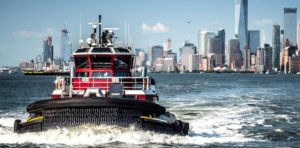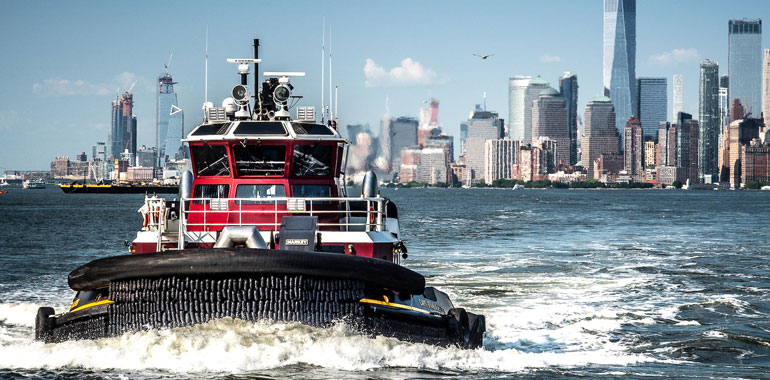
With a year of the pandemic behind us, McAllister Towing continues to adjust to the effects that COVID-19 has had on the tugboat industry worldwide.
“The initial pandemic outbreak brought a slowdown of business, which resulted in a number of employees being furloughed,” said Capt. Steven Kress, vice president of operations for McAllister. “Some of the employees were never brought back from furlough and were permanently laid off as business shrank. Fewer ships calling on New York required fewer tugs.”
To keep the virus at bay at the administrative level, McAllister implemented a work-from-home policy, with employees communicating via phone and virtual meetings. The 24-hour dispatch operations center remained open with COVID protocols in place.
“We’ve returned to the office on an alternating schedule to make sure that we are able to properly space out,” Kress said in November.
Kress recited a comprehensive list of protocols that include wearing a mask, social distancing and an intensive disinfection program using antimicrobial soap on doorknobs and frequently touched surfaces in common areas. For a period of time, the company covered frequently touched areas with antimicrobial film.
In addition, McAllister installed touchless faucets in the kitchens and bathrooms, as well as touchless toilet flush mechanisms. It also increased the frequency of cleaning service visits.
Early in the pandemic, crewmembers avoided airports and planes by commuting solo by vehicle to their boats.
“Tug crews are kept isolated on their respective tugs, and on crew change days the boats are cleaned and disinfected,” Kress said. “Incoming crews must fill out a contact questionnaire and have their temperature taken.”
A bright light for McAllister’s East Coast fleet during the pandemic has been traffic at the Port of Wilmington, N.C. North Carolina Ports has aggressively upgraded facilities and access for the massive neo-Panamax containerships now transiting the expanded Panama Canal. Three neo-Panamax cranes have been installed at Wilmington, containership berthing space has been increased by 2,600 contiguous feet, and the air draft at the Cape Fear Memorial Bridge has been increased.
“We in the tugboat industry, being considered essential, have continued to work, all the while observing best practices and COVID-19 protocols,” said Capt. Glenn Turbeville, vice president and general manager for McAllister’s Wilmington fleet. “We have been very fortunate at McAllister Towing of Wilmington, with no lost time due to COVID. We will be redoubling our efforts now as winter is arriving.” •

